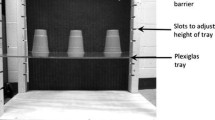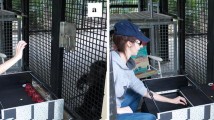Abstract
In previous research, great apes and rhesus macaques have demonstrated multiple apparently metacognitive abilities, whereas capuchin monkeys have not. The present experiment investigated whether at least a rudimentary form of metacognition might be demonstrated in capuchins if a simplified metacognitive task was used. Capuchins (Cebus apella) were required to locate a food reward hidden beneath one of two inverted cups that sat on a Plexiglas tray. In some conditions, the capuchins were shown where the food was hidden, in others they could infer its location, and in yet others they were not given information about the location of the food. On all trials, capuchins could optionally seek information about the food’s location by looking up through the Plexiglas beneath the cups. In general, capuchins did this less often when they were shown the food reward, but not when they could infer the reward’s location. These data suggest that capuchins—if metacognitive—only metacognitively control their information seeking in some conditions, particularly those in which information is presented in the visual domain. This may represent a rudimentary version of metacognitive control, in comparison with that seen in great apes and humans.






Similar content being viewed by others
References
Basile BM, Hampton RR, Suomi SJ, Murray EA (2009) An assessment of memory awareness in tufted capuchin monkeys (Cebus apella). Anim Cogn 12:169–180
Beran MJ, Smith JD (2011) Information seeking by rhesus monkeys (Macaca mulatta) and capuchin monkeys (Cebus paella). Cognition 120:90–105
Beran MJ, Smith JD, Redford JS, Washburn DA (2006) Rhesus macaques (Macaca mulatta) monitor uncertainty during numerosity judgments. J Exp Psychol Anim Behav Process 32:111–119
Beran MJ, Smith JD, Coutinho MV, Couchman JJ, Boomer J (2009) The psychological organization of “uncertainty” responses and “middle” responses: a dissociation in capuchin monkeys (Cebus apella). J Exp Psychol Anim Behav Process 35:371–381
Beran MJ, Perdue BM, Smith JD (2014) What are my chances? Closing the gap in uncertainty monitoring between rhesus monkeys (Macaca mulatta) and capuchin monkeys (Cebus apella). J Exp Psychol Anim Learn Cogn 40:303–316
Call J (2004) Inferences about the location of food in the great apes (Pan paniscus, Pan troglodytes, Gorilla gorilla, and Pongo pygmaeus). J Comp Psychol 118:232–241
Call J (2010) Do apes know that they could be wrong? Anim Cogn 13:689–700
Call J (2012) Seeking information in non-human animals: weaving a metacognitive web. In: Beran MJ, Brandl J, Perner J, Proust J (eds) Foundations of metacognition. Oxford University Press, Oxford, pp 62–75
Call J, Carpenter M (2001) Do apes and children know what they have seen? Anim Cogn 3:207–220
Carruthers P (2008) Meta-cognition in animals: a skeptical look. Mind Lang 23:58–89
Couchman JJ, Beran MJ, Coutinho MV, Boomer J, Zakrzewski A, Church B, Smith JD (2012) Do actions speak louder than words? A comparative perspective on implicit versus explicit meta-cognition and theory of mind. Br J Dev Psychol 30:210–221
Crystal JD, Foote AL (2009) Metacognition in animals. Comp Cogn Behav Rev 4:1–16
Crystal JD, Foote AL (2011) Evaluating information-seeking approaches to metacognition. Curr Zool 57:531–542
Foote AL, Crystal JD (2012) “Play it Again”: a new method for testing metacognition in animals. Anim Cogn 15:187–199
Hampton RR (2001) Rhesus monkeys know when they remember. Proc Nat Acad Sci 98:5359–5362
Hampton RR (2009) Multiple demonstrations of metacognition in nonhumans: converging evidence or multiple mechanisms? Comp Cogn Behav Rev 4:17–28
Hampton RR, Zivin A, Murray EA (2004) Rhesus monkeys (Macaca mulatta) discriminate between knowing and not knowing and collect information as needed before acting. Anim Cogn 7:239–246
Hill A, Collier-Baker E, Suddendorf T (2012) Inferential reasoning by exclusion in children (Homo sapiens). J Comp Psychol 126:243–254
Inman A, Shettleworth SJ (1999) Detecting metamemory in nonverbal subjects: a test with pigeons. J Exp Psychol Anim Behav Process 25:389–395
Jozefowiez J, Staddon JER, Cerutti DT (2009) Metacognition in animals: how do we know that they know? Comp Cogn Behav Rev 4:29–39
Judge PG, Essler JL, Rossettie MS (2013) Capuchin monkeys use conspecific gestural cues to obtain hidden rewards. Am J Primatol 75:44
Lavie N, Hirst A, de Fockert JW, Viding E (2004) Load theory of selective attention and cognitive control. J Exp Psychol Gen 133:339–354
Lyons KE, Ghetti S (2010) Metacognitive development in early childhood: New questions about old assumptions. In: Efklides A, Misailidi P (eds) Trends and prospects in metacognition research. Springer, Boston, pp 259–278
Marsh HL (2014) Metacognitive’ information seeking in lion-tailed macaques: a generalized search strategy after all? Anim Cogn. doi:10.1007/s10071-014-0767-7
Marsh HL, MacDonald SE (2012a) Information seeking by orangutans: a generalized search strategy? Anim Cogn 15:293–304
Marsh HL, MacDonald SE (2012b) Orangutans (Pongo abelii) “play the odds”: information-seeking strategies in relation to cost, risk, and benefit. J Comp Psychol 126:263–278
Marsh HL, Vining AQ, Levendoski E, Judge P (under review) Inference by exclusion in lion-tailed macaques (Macaca silenus), a hamadryas baboon (Papio hamadryas), capuchins (Sapajus apella), and squirrel monkeys (Saimiri Sciureus). J Comp Psychol
Nelson TO, Narens L (1990) Metamemory: a theoretical framework and new findings. Psychol Learn Motiv 26:125–141
O’Neill DK, Gopnik A (1991) Young children’s ability to identify the sources of their beliefs. Dev Psychol 27:390–407
Paukner A, Anderson JR, Fujita K (2006) Redundant food searches by capuchin monkeys (Cebus apella): a failure of metacognition? Anim Cogn 9:110–117
Pillow BH (1989) Early understanding of perception as a source of knowledge. J Exp Child Psychol 47:116–129
Pillow BH (1999) Children’s understanding of inferential knowledge. J Genet Psychol 160:419–428
Roberts WA, McMillan N, Musolino E, Cole M (2012) Information seeking in animals: Metacognition? Comp Cogn Behav Rev 7:85–109
Rypma B, Berger JS, D’esposito M (2002) The influence of working-memory demand and subject performance on prefrontal cortical activity. J Cogn Neurosci 14:721–731
Shields WE, Smith JD, Washburn DA (1997) Uncertain responses by humans and rhesus monkeys (Macaca mulatta) in a psychophysical same-different task. J Exp Psychol Gen 126:147–164
Smith JD (2009) The study of animal metacognition. Trends Cogn Sci 13:389–396
Smith JD, Schull J, Strote J, McGee K, Egnor R, Erb L (1995) The uncertain response in the bottlenosed dolphin (Tursiops truncates). J Exp Psychol Gen 124:391–408
Smith JD, Shields WE, Schull J, Washburn DA (1996) The uncertain response in humans and animals. Cognition 62:75–97
Smith JD, Shields WE, Allendoerfer KR, Washburn DA (1998) Memory monitoring by animals and humans. J Exp Psychol Gen 127:227–250
Smith JD, Beran MJ, Redford JS, Washburn DA (2006) Dissociating uncertainty responses and reinforcement signals in the comparative study of uncertainty monitoring. J Exp Psychol Gen 135:282–297
Sodian B, Wimmer H (1987) Children’s understanding of inference as a source of knowledge. Child Dev 58:424–433
Veenman MVJ, Spaans MA (2005) Relation between intellectual and metacognitive skills: age and task differences. Learn Individ Differ 15:159–176
Vo VA, Li R, Kornell N, Pouget A, Cantlon JF (2014) Young children bet on their numerical skills: metacognition in the numerical domain. Psychol Sci. doi:10.1177/0956797614538458
Woolley JD, Bruell MJ (1996) Young children’s awareness of the origins of their mental representations. Dev Psychol 32:335–346
Acknowledgments
We wish to thank Dr. Peter Judge, Mary Gavitt, Gretchen Long, and the rest of the caretaking staff at the Bucknell University Animal Behavior Laboratory, for their assistance and support with this research. We also thank Andrew Marsh for his assistance with apparatus construction. Finally, we thank Dr. William Roberts as well as the anonymous reviewers for their comments on an earlier version of the manuscript. This research was supported by a Natural Sciences and Engineering Research Council of Canada postdoctoral fellowship awarded to H. Marsh.
Author information
Authors and Affiliations
Corresponding author
Rights and permissions
About this article
Cite this article
Vining, A.Q., Marsh, H.L. Information seeking in capuchins (Cebus apella): A rudimentary form of metacognition?. Anim Cogn 18, 667–681 (2015). https://doi.org/10.1007/s10071-015-0835-7
Received:
Revised:
Accepted:
Published:
Issue Date:
DOI: https://doi.org/10.1007/s10071-015-0835-7




